- Home
- Peter Carey
My Life as a Fake Page 8
My Life as a Fake Read online
Page 8
Of course I did not doubt that it would be a shock for him to meet me. Given that he thought me dead. Rather than frighten him in the street I decided to confront him in the safety of his own home. He lived in a flat in Flinders Lane, a very short walk from Collins Street.
You are doubtless more worldly than I am, the madman told Chubb as he brought him within sight of the children’s graveyard, where, beyond the cemetery’s perimeter, they could see the solitary Skipping Girl sign glowing in the dark-blue eastern sky. I have been called a genius by some, he said without irony, and perhaps that’s why I have very little experience of this world. What I know and what I don’t know are difficult to categorise for people like you—who understand so much about the world and so little about me.
He paused. Chubb felt a moment of crisis had come and he glanced around looking for something that might serve as a weapon.
His captor glowered at him. Is my story dull?
No, not at all. I was thinking that I wished I knew more about you.
Well, I will tell you this, he finally said. I have a very thorough knowledge of the internal-combustion engine but a simple term like ‘silk stockings’ can throw me into the greatest of confusion. Explain that to me if you can?
Not knowing the currents of that injured brain, Chubb was afraid to answer the riddle. He said he did not get it, not at all.
I am trying to tell you, the giant said simply, that I behaved unwisely by forcing Weiss’s front door when he would not answer it.
You broke the door?
For a moment all that great weight of animus seemed to dissolve. His shoulders slumped and he released Chubb’s wrist, raising his large hands to his cheeks.
Alas, he said, I frightened him. I did announce myself, of course. I am Bob McCorkle, I said. And it was not as if he had not seen my photograph. He’d published it himself. You must have seen it too.
Chubb thought, He knows I made that photograph. He is challenging me, but for what end?
I am Bob McCorkle, I told him, he said again. I am your author, Mr. Weiss. But he shrieked at me to get out. Shrieked! At me! He was dressed only in shirt and underpants, but he was my publisher. I loved him. I took off my coat and held it out so he could cover himself but he struck it from my hand and cried, Monster!
I tried not to be upset by this. I had come through that door because all my best thoughts and wishes were centered on his person and all I wished to offer him was release from the suffering he had met on my behalf. I picked up my rejected coat and discovered the bottle I had brought to share with him had been shattered. The whole garment was soaked with wine, the pocket filled with broken glass. It was wrong of me to be offended. I am Bob McCorkle, I repeated. And to prove it I began to recite my poems.
And there and then, in Melbourne General Cemetery at six o’clock on a winter evening, he set his great heavy legs astride and, having once more taken Chubb’s wrist, commenced a strange and passionate recitation.
‘I had often, cowled in the slumberous heavy air …’
Chubb knew the poem, of course, but nothing had prepared him for this performance of it, the strange and passionate waving of his free arm, the twisting of the head, the eyes rolled back like a blind man playing jazz piano. And the voice, which its original author had always imagined to be some variation of standard BBC English, was here so fierce and nasal, hoarse, ravaged by failure and regret. Chubb had heard a recording of Eliot reading and judged it as boring as a sermon, but this man was like a tethered beast, a wild man inside a cage.
I had often, cowled in the slumberous heavy air,
Closed my inanimate lids to find it real,
As I knew it would be, the colourful spires
And painted roofs, the high snows glimpsed at the back,
All reversed in the quiet reflecting waters—
Not knowing then that Durer perceived it too.
Now I find that once more I have shrunk
To an interloper, robber of dead men’s dream,
I had read in books that art is not easy
But no one warned that the mind repeats
In its ignorance the vision of others. I am still
The black swan of trespass on alien waters.
This was and was not the poem Chubb had written. It had been conceived as a parody and the first key to the puzzle of the hoax, but this lunatic had somehow recast it without altering a word. What had been clever had now become true, the song of the autodidact, the colonial, the damaged beast of the antipodes.
My God, Chubb said. What did Weiss make of your recital?
He said I was a fake.
And what did you do? Chubb asked this with some considerable dread. A confession now seemed imminent, and he feared the consequence would be his own death.
I showed him the piece of scalp I had cut from Vogelesang.
And then?
He fled from me, the man said wearily. I followed him like you might go after a kitten that has escaped its basket. He was trying to climb out a sash window and I called that I meant him no harm, but he said I should cease tormenting him, that he had been tormented more than any man alive and I must leave off. And you too. He spoke your name and said I was your creation, that you’d put my parts together. All this time he was trying to get out the window. I swear I didn’t go near him. I don’t know why he would choose to climb out the top but the chair tipped and slid out from under him and he fell to the floor, giving his head a mighty crack against the wall as he did so.
And died.
I killed him, yes, the man said, and in his distress he once again released Chubb’s hand.
In Room 604 of the Merlin Hotel, Christopher Chubb opened his own hands, whose lines of fate and love were highlighted by the oil of bicycles.
I was free, he said. I ran like a rabbit through the dark. I fell and rolled and came up running.
Next day, he said, I had a bruised face and a twisted ankle but I knew I had to go outstation. I dragged my old duffel bag into Spencer Street and spent three pounds on a second-class ticket to Sydney.
16
On that thundering day in Kuala Lumpur I could not guess what talent the remainder of the McCorkle manuscript might reveal. Thus far I had seen no more than the fantastical aura surrounding it, had glimpsed only the carapace; in other words, the story. To say I was intrigued by both is to understate it, but given Chubb’s history of trickery I felt it unwise to proceed too eagerly. And that was how I became a fake myself, pretending that I would ‘write him up,’ not for an instant imagining that thirteen years later I would sit down here in Antrim’s gatehouse to do that very thing, and much more besides.
I had no understanding yet of what I was flirting with, no idea that Chubb’s story would soon send me travelling to Singapore and from there to Sydney and Melbourne in a vain attempt to establish the true nature of this gigantic man who had emerged, so I assumed, from the darkest recesses of Chubb’s disturbed imagination.
Three years later I would be in Australia again and, after I had driven those dreary six hundred miles that separate Melbourne from Sydney, I understood not a great deal more, only the vast distance Chubb had fled from his phantasm.
Chubb had been a sort of beloved boy in Sydney literature, respected not only for his precocious learning and the rigor of his arguments but for his ferociously high standards. The boy from Haberfield was known for the small number of poets he would allow into his library: Donne, Shakespeare, Rilke, Mallarmé. He had been born into a second-rate culture, or so he thought, and one can see in that austere bookshelf all the passion that later led to the birth of Bob McCorkle—a terror that he might be somehow tricked into admiring the second-rate, the derivative, the shallow, the provincial.
I heard about this bookshelf many times, but more often it was his affection for Jelly Roll Morton that his friends remembered, the long boozy nights when he played race music with a cigarette dangling from his mouth, a sweet private smile emerging from the shadowed corners of
his lips. In this context, men never failed to mention his attractiveness to women. They came to him, they said, without him having to do a bloody thing. He played the piano and they rubbed his monkish head.
Yet when he returned home to Sydney after Weiss’s death, he made no attempt to contact anyone he knew. He told me: I was a murderer, I had no face. I could not bear it, Mem, to feel such shame. He stayed away from Paddington and Darlinghurst and Kings Cross, places where he might run into fellow poets and artists.
Before long he got himself a job in advertising, writing fashion copy—a perfect hiding place for such a High Art character. He bought the first of many suits, a white shirt, a grey felt hat—Sydney was a sea of grey felt hats in those years. Then he rented a shabby semi in Chatswood, a lower-middle-class suburb which he had always thought hateful and life-denying. No-one here would give a damn for poetry or David Weiss.
That is where these were written, Mem. He did not say ‘by McCorkle’ and I did not ask. But it was clear I was to be given the parcel immediately. My throat was suddenly quite dry. I poured cold tea and drank it while he peeled off the black tape with his habitual care. Finally, from the two plastic bags he withdrew a thick sheaf of paper bound with a red rubber band which broke just as he removed it.
When he held out the bundle, I was frightened to display my greed.
Read, Mem, he insisted.
These pages were dry and dusty to the touch, typed on crumbling yellow paper of a variety once used for mimeographs.
Please, take your time.
But not one of these lines bore the vaguest resemblance to that single page which had so excited me. Are these by Bob McCorkle? I asked, speaking as if he were completely real.
Read, he said.
That is, no.
I did read all forty-three poems, if only to hide my huge irritation from their author, whose stomach I could hear rumbling not three feet away. It is one thing to get this sort of drivel in the mail, another to judge it in the presence of such neediness. Though well accustomed to rejecting poets, I could not think of a single encouraging remark to offer him.
If this was his ‘real’ poetry, then I preferred the fake. True, these had none of the obfuscations that sometimes marred the ‘McCorkle.’ Nor did they have its life, its wildness, its nasal passion, the sense that nothing on earth can matter but a poem. Frankly, these dry yellow pages were priggish, self-serving, snobbish. The Poet in these verses was a paragon of art, of learning. His enemies were Philistines and Trolls, and in particular there appeared and reappeared a strange little narrow-shouldered man with hairy thin wrists, white-speckled shoulders, a shining eggshell scalp. He was variously The Judge, The Executioner, The Spy. And in hopes of cloaking my disappointment with these dreary quatrains, I talked eagerly about these menacing phantoms, making much of their physicality.
He understood exactly what I was doing. Silently, he retrieved his pages and, without once looking at me, entombed them again inside their plastic bags. Seeing as you admired them, he said, let me tell you these personae are all based on old Blackhall.
Of course I had no idea who Blackhall was.
The Landlord. The Spy. Can you bear to listen? I do not wish to bore you.
Absolutely, I said. Of course. I picked up a pen I would rather have hurled across the room.
Mr Blackhall turned out to be not only Chubb’s Chatswood landlord but also the local stationmaster. He was moreover, Chubb said, a compulsive and unapologetic snoop. Each night there would be a handwritten note in the kitchen. ‘Mr Chubb, you left the tap dripping.’ ‘Mr Chubb, would you please mop up the bathroom floor?’ What could I do, Mem? The rent was very low. But when I realised he was going through my verse, I was not happy-lah.
As Chubb described the little traps he set to prove the landlord’s intrusions, his mood improved. Mischief showed in his fleeting smiles and his hands became precise, pincered thumbs and forefingers as he explained his various stratagems. It was a gift, he said. For that whole year, it was my most intimate human dialogue, me and my voyeur.
I asked if he had been lonely. No, he was quite content. The job was easy, the money good. Also, he said, if I had not become a copywriter I would never have seen Noussette again.
Was that Weiss’s girlfriend?
This, it seemed, was absolutely the wrong question, and having seen him cheer up I now had to suffer his irritation.
His brow furrowed as he fussed with his sarong. What a thing to say!
But this is the same woman John mentioned?
Obviously another bad question.
He shot me a hard glance. Slater was taunting me, yes or not?
I beg your pardon?
Saying how he wished to sleep with her.
How could that be taunting you?
Typically, he turned away from so direct a question.
There is an urge to always match people, no? We expect a couple to be samah-samah, equal in attractiveness, so I must tell you Noussette was much more attractive than I was. No contest-lah.
17
There could be no story without Noussette, he said. I would not be here, I promise you. I would be free.
How was he not free? He did not elaborate.
Noussette, he said, was only twenty-four, but she could paint-lah. Big reputation, believe me.
Indeed, as I would discover at the National Gallery of Australia, Chubb was not exaggerating. Though Nousette’s later work turned out to be unbearably disingenuous, the early paintings were much steelier: small, completely abstract, owing something to the British and Russian constructivists. The gallery identifies her as Noussette Markson (Australian-Russian) but from the time she turned up in Collins Street she was a Polish Jew. Perhaps it is true, as the historian John Finch has recently written, that Noussette Markson was really Mary Morris from Wangaratta, yet when Chubb knew her it was generally accepted that she was European. Her accented English was sprinkled with French words and phrases, and she once won twenty pounds by reciting Les Fleurs du mal in its entirety.
She was one of those women who like to associate with the most daring males and push them to increasingly foolhardy acts. It was Noussette Markson who challenged Albert Tucker to climb onto the roof of the State Parliament, but only after she had performed the feat herself. She was also famous, Chubb revealed, for having used the men’s urinal at the Australia Hotel, not at a quiet hour either, and she’d had affairs with many well-known painters and critics including Gordon Featherstone and David Weiss.
Noussette had been a Marxist throughout the war. Chubb was therefore surprised to see her name show up on a pin board in an advertising agency. ‘Photographer: Noussette Markson,’ written on a work order in the traffic manager’s office.
Wah! I could not believe it, he said. Impossible.
Curiosity drew him to a studio in Kent Street, a grimy industrial site with tanneries and wool stores as its neighbours. And in a white-walled loft on the fourth floor he discovered the former Marxist confidently in control of a production which would eventually feature in the pages of Vogue magazine.
Two months before, in Melbourne, she had long auburn hair and a tiny waist, with peasant-like skirts that flared and flounced when she walked. She had very long legs, and though she often wore slippers in her studio she never ventured out into the street in anything but high heels. Now, in Sydney, her hair was cropped short in the manner of someone who had been caught in flagrante with the enemy, which, from her political point of view, was not inappropriate. The skirts were gone, replaced by pants and a long, soft shirt whose colours were the sole reminder of her previous life, for they were all—right down to the single small black button at the neck—in the palette of her paintings.
This transmutation stirred Chubb excessively. At first it seems paradoxical that a man who put such weight on the truth should be so excited by a woman who cared so little about it. But Chubb was mired in his own history, and it is not difficult to imagine how attractive it must have been to see
someone shed her past like an old skin.
How had she managed this transformation, not just of wardrobe, but of profession? There was no clear answer. On that first day Chubb was impressed by what appeared to be her complete mastery of the technical situation, the confidence with which she ordered the lights moved or the lens of the Hasselblad changed, and also the way she directed the model, which is not a skill a painter learns in life class. She was purposeful, even harsh, with everyone except the model, towards whom she exhibited an almost maternal warmth, constantly purring and stroking.
Noussette seemed not to notice Chubb’s arrival and he remembered thinking that she moved like a dancer, with square shoulders and a straight back; even if her trousers revealed a bigger backside than he might have guessed in Melbourne, this did nothing to diminish her athleticism and grace. She moved continually back and forth between the camera and the model, and by the end of the shoot he could see the girl just hanging on her next instruction. Noussette whispered in her ear and made her laugh, creating a conspiracy which everyone else in the studio—the agency account executive, art-director, the two assistants, and certainly Chubb—felt excluded from and charmed by all at once.
There was no dressing room, nowhere to hide but a tiny lavatory with a stained bowl, and the model changed with a casual immodesty that would not be shocking to anyone who has been backstage at a fashion show. Chubb, however, was simultaneously startled and titillated to see the girl slip out of her suit and stand before the photographer in her underwear. At that moment he realised that he should not be there, an intuition that became a certainty when he saw Noussette place her hand behind the girl’s long neck and draw her to her lips. They kissed, in front of everyone.
Such behaviour is almost expected in London these days, but this was post-war Sydney. The account executive was a sturdy, corseted woman in her early fifties, and the art-director a shy, wispy girl just past twenty. Two people could hardly have been more different yet they showed an almost identical tilt of the head as they smiled fixedly at the shocking sight before them.

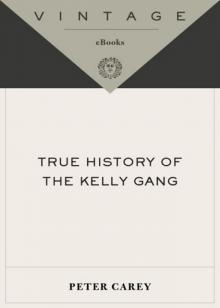 True History of the Kelly Gang
True History of the Kelly Gang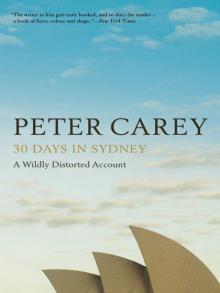 30 Days in Sydney: A Wildly Distorted Account
30 Days in Sydney: A Wildly Distorted Account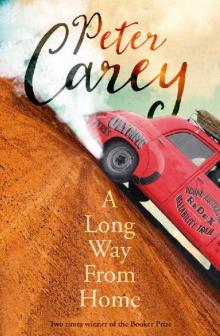 A Long Way From Home
A Long Way From Home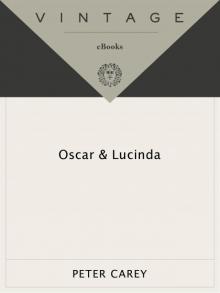 Oscar and Lucinda
Oscar and Lucinda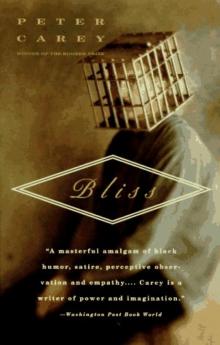 Bliss
Bliss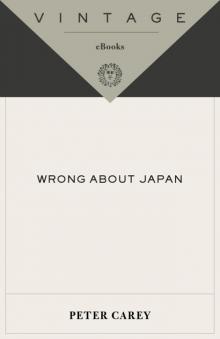 Wrong About Japan
Wrong About Japan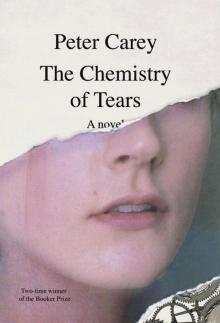 The Chemistry of Tears
The Chemistry of Tears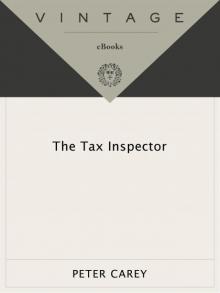 The Tax Inspector
The Tax Inspector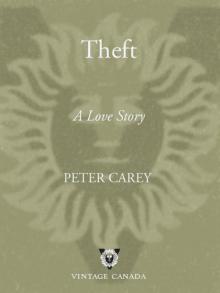 Theft: A Love Story
Theft: A Love Story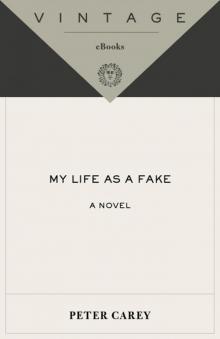 My Life as a Fake
My Life as a Fake Collected Stories
Collected Stories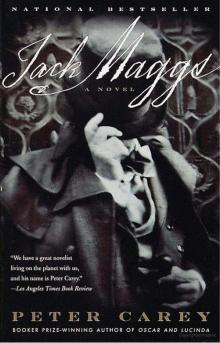 Jack Maggs
Jack Maggs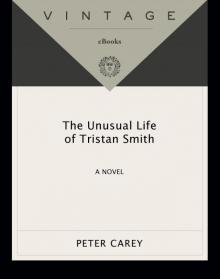 The Unusual Life of Tristan Smith
The Unusual Life of Tristan Smith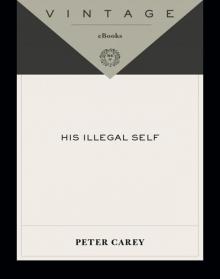 His Illegal Self His Illegal Self His Illegal Self
His Illegal Self His Illegal Self His Illegal Self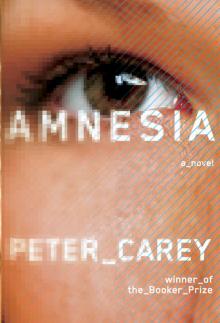 Amnesia: A Novel
Amnesia: A Novel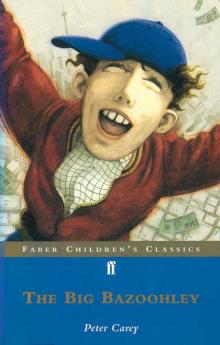 The Big Bazoohley
The Big Bazoohley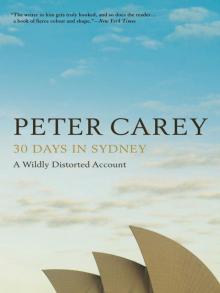 30 Days in Sydney
30 Days in Sydney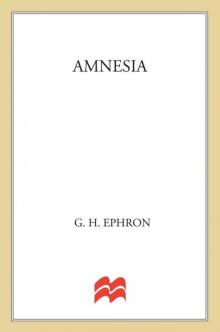 Amnesia
Amnesia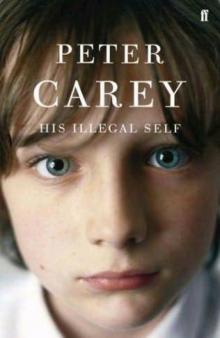 His Illegal Self
His Illegal Self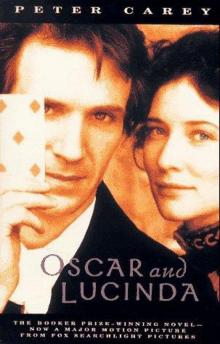 Oscar and Lucinda bw-1988
Oscar and Lucinda bw-1988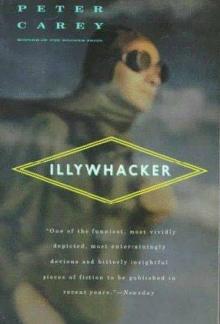 Illywhacker
Illywhacker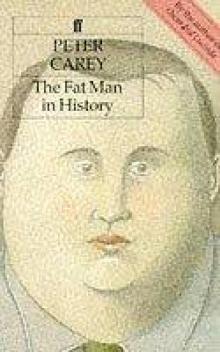 The Fat Man in History aka Exotic Pleasures
The Fat Man in History aka Exotic Pleasures